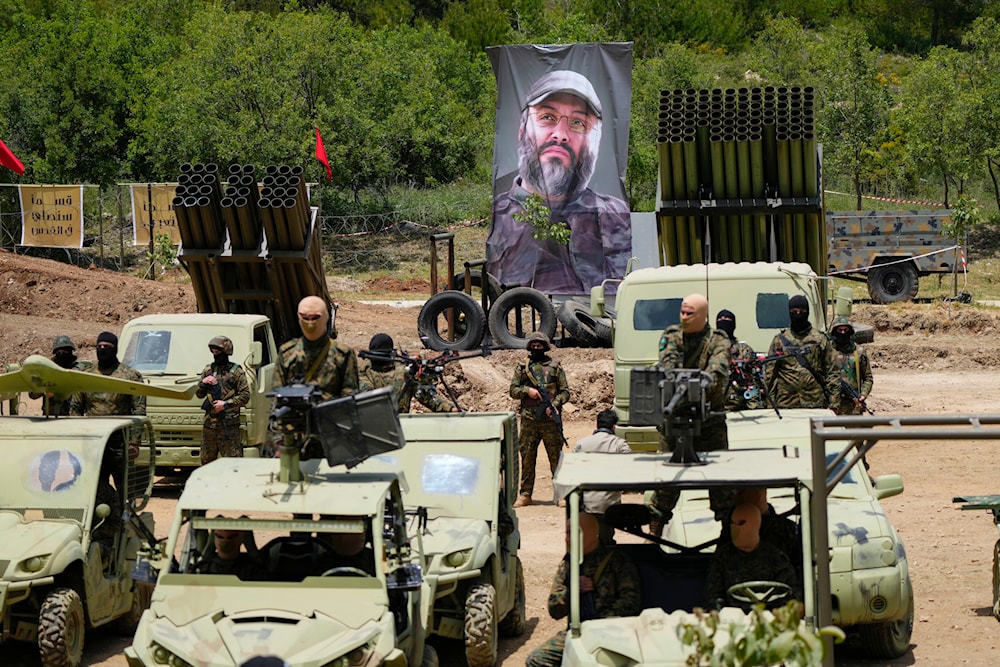Not enough Iron Domes in world to fend off Hezbollah arsenal: Politico
Politico underlines that the Israeli occupation forces would not be able to take on Hezbollah's arsenal as it does not have sufficient air defense systems.
-

Fighters from the Lebanese militant group Hezbollah carry out a training exercise in Aaramta village in the Jezzine District, southern Lebanon, Sunday, May 21, 2023. (AP)
The Israeli occupation is grappling with a critical shortage of munitions, casting doubt on its ability to repel a major anticipated attack from Iran and Hezbollah amid concerns about whether neighboring Arab nations would offer the same level of support for the Israeli occupation as before, Politico reported on Tuesday.
The concerns arose in light of the Israeli occupation's latest acts of aggression, wherein it assassinated Hamas leader Ismail Haniyeh in Tehran, Iran, and Hezbollah senior commander Fouad Shokor in Beirut, Lebanon. Tehran warned the Arab nations that came to the Israeli occupation's aid last time—when Iran launched an extensive attack involving 300 missiles and drones— not to stand in its way this time around.
Jonathan Lord, director of the Middle East security program at the Center for a New American Security, highlighted the regional discontent. "There's a certain degree of fatigue and to some degree, I would imagine a resentment that we're in this situation right now off the backs of the assassinations of Shokor and Haniyeh," he stated.
With Hezbollah poised to avenge Shokor's death, it is expected to employ its strategic reserves of precision-guided missiles, targeting southern regions of the occupied Palestinian territories.
Simply not enough Iron Domes
Tom Karako, director of the Missile Defense Project at the Center for Strategic and International Studies, emphasized the strain on the Israeli occupation's defenses. He noted that Iran and its "proxies" could "overwhelm a particular defense system at a particular place and a particular time," given the current depletion of the Israeli Iron Dome interceptors.
"It's inventory capacity of Iron Domes. There's not enough Iron Domes in the world to deal with 100,000 rockets, and that's not the fault of Iron Dome or any other system. It's just basic arithmetic," Karako explained.
Lord predicted that despite their frustration, Arab leaders might reluctantly join the effort to counter Hezbollah and Iran. "Logic would prevail that they need to step up and continue to do their part to essentially nerf this attack as best as possible."
The US anticipates support from its Arab allies, but a former US diplomat cautioned that any lack of support could be attributed to Israeli Prime Minister Benjamin Netanyahu's policies.
"It's a question of shared frustration with a conflict in which neither side, neither Hamas nor Netanyahu, is proving amenable to compromise," the diplomat said. "You see [Secretary of State Antony Blinken] and [President Joe Biden] constantly trying to pour water on this fire for a while, but then it flames up again, and in many instances, it's Netanyahu lighting the match."
Netanyahu seeking to escalate
This falls in line with what John Sawers, former head of the British Secret Intelligence Service MI6 and UK ambassador to the UN, said in the Financial Times earlier in the week. Sawers considered that "Israel's" assassination of the head of Hamas' Political Bureau Chief Ismail Haniyeh in Tehran and Shokor in Beirut revealed Netanyahu's priorities and strategy.
The Israeli Prime Minister "is prepared to escalate tensions in the region rather than seeking to calm them," he pointed out.
Sawer said that Haniyeh's assassination also proves that Netanyahu is not interested in a ceasefire in Gaza and a prisoner exchange deal with Hamas, adding that the release of Israeli captives held in the Gaza Strip "doesn’t feature prominently in his strategy" as he has turned down numerous deals supported by his own security officials.
In a related context, Bloomberg discussed the threats facing "Israel" and its air defense systems as it prepares for the possibility of new aerial attacks from Iran, Hezbollah, and Yemen.
Bloomberg said that "Israel’s" billion-dollar air defense systems are being tested, especially as Hezbollah and the Yemeni Armed Forces have intensified their use of kamikaze drones, "which have proven more effective at evading Israel’s high-tech defenses than missiles and rockets."
The report mentioned that Iran is believed to possess a substantial stockpile of ballistic and cruise missiles, as well as inexpensive drones, which it used in mid-April in its retaliation against the Israeli aggression that targeted its consulate in Damascus.
Regarding Hezbollah, Bloomberg emphasized that the Lebanese group is believed to have an arsenal of over 150,000 missiles, including long-range and precision-guided ones.
According to Israeli assessments, these missiles could potentially reach deep into "Israel", targeting major cities and strategic assets such as military bases, airports, power grids, and hospitals.

 5 Min Read
5 Min Read








